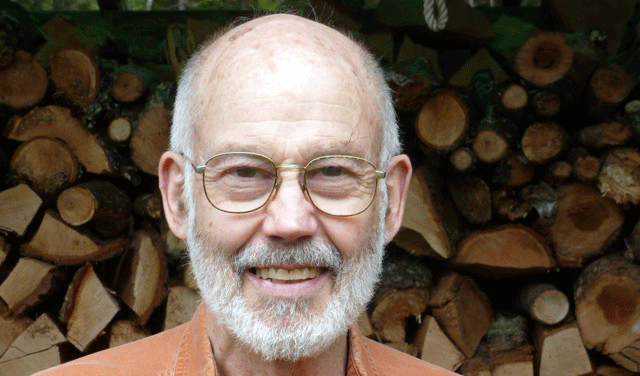By Dana Wilde
Every Tuesday morning, Belfast’s poet laureate makes his way to the Belfast Free Library, where he holds “office hours.” He doesn’t like the phrase “office hours.” Sounds suspiciously like lectures might be involved. He’s stuck with it, though.
Anyway, a group of poets, of all shapes, sizes, and skill levels, gathers there each week. They’re just curious about writing poetry.
“There’s some magic in this group of people,” Thomas Moore says. He was appointed the city’s lead poet in 2017, after moving from his longtime home in Brooksville. When asked how he got the job, he deflects the honorary title as obliquely as he deflected the phrase office hours, saying he was invited to apply by other local poets. Weirdly, there starts to be a clue here about what the word “magic” means.
It would be possible to think of Moore as a brow-furrowing English professor, since he holds advanced degrees in English, taught writing and literature for years at Maine Maritime Academy, and has been writing poetry since the 1960s, most intensively since his retirement from MMA in 2006. He has three book-length collections, The Bolt-Cutters(2010), Chet Sawing(2012), and most recently Saving Nails, published in 2016 by Moon Pie Press of Westbrook.
His poetry has appeared in publications like Boston Literary Magazine,Cafe Reviewin Portland, and the Bangor Daily News. Among his awards is a 2016 Pushcart Prize for “How We Built Our House.” He received a writers grant from the Maine Arts Commission, was writer-in-residence at the Elizabeth Bishop house in Nova Scotia, contributed a video to the “20 Maine Poets Read and Discuss Their Work” series, and his poetry has made appearances on the National Public Radio show “The Writer’s Almanac,” in Ted Kooser’s “American Life in Poetry” column, and in former Maine Poet Laureate Wesley McNair’s “Take Heart” column.
But in “office hours,” all these accolades are beside the point—which is the poetry. The group’s objective is to communicate luminous thoughts, and a tenet—if you can call it that—is that “the process of writing is the process of discovery.” The poets work around their poetic yards, observing everything and digging into whatever gets their attention. They’re practicing “wheelbarrow poetry,” Moore says with a wry smile. The results contain magic.
ACCESSIBLE MAGIC
He says academic-oriented poetry can be “indecipherable to many and appeals to a very small group.” Wheelbarrow poetry, though, is about life as it’s actually lived and talked—true to Moore’s own writing.
Hallmarks of his poetry are its accessibility—meaning it’s stated in ways that are easily grasped—and its linguistic precision—meaning he is one of Maine’s most adept verbal craftsmen. Far from being difficult to decipher, Moore’s poems evoke ranges of simple and complex emotions, from natural awe to unutterable grief; they’re often funny, but never trite. This is part of the magic.
“When you read a poem with something going on in it, you get this shiver,” he says, when asked how you can tell when poetry is succeeding. It’s a way of saying life itself gives the shiver.
In some ways the process of discovery in writing is a metaphor for Moore’s own life, which seems to have been an active struggle for meaning. After growing up in Massachusetts he went on the road, like many young Americans his age. He spent six months working on a dairy farm in New Zealand, and lived in Turkey for three years where he taught English. He also served in the Peace Corps in Mali and in Iran, where in 1965 he wrote his first poem, about a statue of the Shah in the city of Tabriz. He taught high school English in Massachusetts for many years, but gave that up to work as a carpenter. As the physical labor took its toll, he decided to return to teaching, studied for a doctorate, and started teaching at MMA in 1996.
Along the way, he remained fascinated with language and its capacity to convey “deep knowledge, deep secrets” discovered primarily in his own life and surroundings. Even the simplest objects and activities become luminous in Moore’s world: building the house with his wife, Leslie (also an award-winning writer and artist); remembering his childhood and other life-changing times, including the loss of his two children to illness (during which “writing saved my life”); and in particular, observing the natural world.
“I think there’s a hunger for insight about nature,” he says. “If you observe a seal or a bear that comes up to your feeder, and capture that joy or insight” in a way that hopefully triggers that shiver, then your wheelbarrow work has succeeded.
Often the shiver comes with a sense of humor (in “Chick Magnets,” Tom Brady attends a poetry reading), or the recollection of deep grief (“My Daughter’s Funeral”), or a philosophy of workshop tools (saving used nails is not “miserliness” but “caring” learned from a benefactor). You sense an authentic, down-to-earth love of poetry in all of Moore’s words, written and spoken. For him, the poetry’s the thing —above all else. “Frequently my poem is far from the best one in the (Tuesday morning) group,” he says.
Every wheelbarrow counts.
Moore is at work on a fourth collection of poems. The Wheelbarrow Poets meet during the poet laureate’s “office hours,” 9:45-11 a.m. Tuesdays in the Belfast Free Library conference room. The poet laureate’s official website is www.northcountrypress.com/summer-to-fall). His email address is universe@dwildepress.net.





